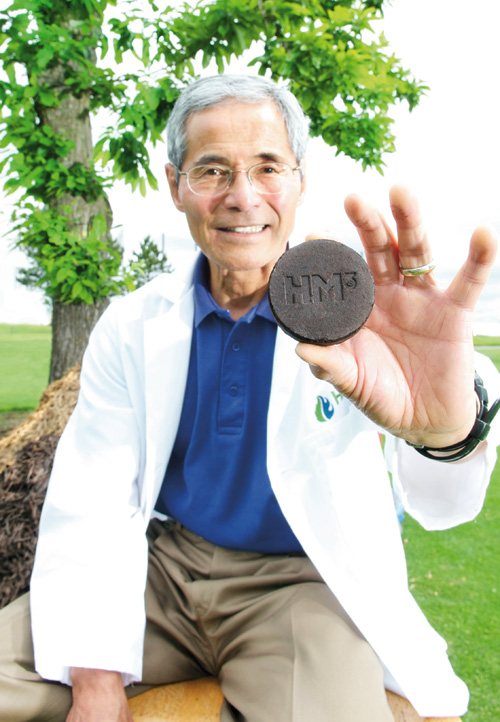 One of the most ambitious rural job creation ideas in Oregon comes from a Ph.D. scientist eight years past retirement age who has figured out a way to run coal burning power plants on—plants.
One of the most ambitious rural job creation ideas in Oregon comes from a Ph.D. scientist eight years past retirement age who has figured out a way to run coal burning power plants on—plants.
 |
Hiroshi Morihara of HM3 Energy in Gresham hopes to start up factories throughout rural Oregon to replace coal with torrefied biomass. |
By Ben Jacklet
Imagine replacing coal with a clean-burning, carbon-neutral fuel source.
Imagine generating the same amount of electricity at the same power plants already used for coal — without spending millions to modify the plant, or billions to replace it.
Now imagine 20 to 25 new factories in some of the most economically depressed timber towns in Oregon, humming with activity as workers produce this new fuel source.
Imagine 1,500 new jobs bringing new life to moribund industrial parks from Coos Bay to Prineville to Burns.
These seemingly far-flung scenarios are the pillars of the latest business venture of Hiroshi Morihara, a 73-year-old scientist and business leader with a long record of accomplishments.
Morihara spent the 1990s running complex biotech companies in the Bay Area, flying from Portland to San Francisco each Monday morning at 6 and returning each weekend. Prior to that, he helped develop an advanced silicon processing plant in Moses Lake, Wash., that is still operating with the same technology after 25 years of production. Somewhere along the way, he and a partner bought the sprawling Persimmons Golf Course in Gresham, so when he wasn’t flying to and from the Bay Area to oversee the work of high-level scientists, he was running the golf course, teaching skiing (certified ski instructor since 1974) or running marathons (52 so far). “I’m used to being super busy,” he says, with a shrug.
Morihara is the founder and CEO of HM3 Energy, a small startup specializing in the torrefaction of woody biomass. Torrefaction is the process of using extreme heat to convert plant material into a dry, dense fuel that burns efficiently and cleanly. Morihara says he and his team of scientists can convert any plant material — forest slash, juniper, waste wood, crop residues, giant cane, even cow dung — into dense briquettes that can be crushed and fed into a coal-burning power plant with no adjustments to the plant. These briquettes are hydrophobic, meaning they can be stored outdoors in the rain, and when they are burned they emit no mercury and far less sulfur than coal. And while they do emit greenhouse gases, Morihara argues that burning biomass is a carbon-neutral act, since plants absorb the same amount of carbon during their life cycles as they release when burned. Coal, by contrast, is a fossil fuel mined from the earth that adds new carbon to the atmosphere when it is burned.
 |
HM3’s briquettes, made with various kinds of biomass, are intended to replace coal with no modifications required to coal-burning power plants.// Photo by Eric Näslund |
Morihara’s product looks like coal, but if it works as advertised it could end up resembling gold. The Boardman coal plant, run by Portland General Electric (PGE), is Oregon’s largest emitter of greenhouse gases, and its days of burning coal are numbered. PGE has agreed to stop burning coal there by 2020, and the utility is working closely with Morihara as he develops his torrefaction process.
Morihara decided to focus on torrefaction after recognizing PGE’s shift away from coal as a major opportunity for new suppliers. He was working on cellulosic ethanol at the time, converting plants into liquid fuel. Shifting to torrefaction, he and his team began studying what has been done with torrefaction thus far, and testing out various theories to perfect their process at a lab Morihara set up at Mount Hood Community College in Gresham.
Dozens of companies around the globe are working on torrefaction as a solution to the environmental costs of coal. Torrefaction plants have been built in Europe to lower greenhouse gas liabilities at power plants, but they have run into technical issues and are not considered reliable suppliers at this point. But that could change, and if it does, fortunes will be made. “The market is so huge, it is worldwide,” says Morihara. “A lot of winners can be born in this industry. Hopefully we will be one of them.”
Morihara’s plan is to build 20-25 plants at or near former sawmills in Oregon, producing up to 3 million tons of biomass per year. Each plant would create 22 jobs supported by another 50 or so workers responsible for collecting the biomass and bringing it to the plant, plus create various indirect jobs. Political and business leaders who are familiar with Morihara and his latest project are quick to praise him and wish him well. State Rep. Jules Bailey (D-Portland) calls Morihara’s plan an “extremely exciting” opportunity for Oregon to “set a global standard in innovation.”
In February 2010 Morihara tested HM3 briquettes at the Western Research Institute in Laramie, Wyo., the premier coal lab in the Western United States. The results showed that the HM3 product burns as coal burns, requiring no adjustments to power plant design, while releasing significantly less sulfur into the atmosphere and no detectable mercury emissions.
Morihara was thrilled with the results. But test results don’t build factories. So far HM3 has received $590,000 from the U.S. Department of Agriculture, $241,00 from the U.S. Endowment for Forestry and Communities, and $500,000 from private investors buying company shares. He will need more. He is applying for further grants and loans, and recently entered the Clean Tech Open contest for the Pacific Northwest Region. But it won’t be easy. Private lenders (at least those outside of the Internet technology sector) are investing cautiously, and public dollars are drying up as pressure builds from frugal taxpayers.
Rep. Tobias Read (D-Beaverton), a major supporter of Morihara and HM3, says any assistance from the state will need to be balanced with “the fact that we’re out of money.” For example, HM3 had qualified for assistance through the state’s Business Energy Tax Credit (BETC) program, but the state has phased out the program to cut costs. Morihara is also waiting for approval for up to $6 million under the federal EB-5 program that grants green cards to foreign investors for backing projects that create jobs, but applications have soared in that program and competition is tight.
Morihara is fully aware that raising enough money to build factories all over Oregon and winning the race to market for a promising new business (not to mention overcoming the inevitable counterattack from the coal lobby) will present a huge challenge. That’s what he likes.
 |
Morihara, 73, spent the 1990s running biotech companies in the Bay Area while also running Persimmons Golf Course in Gresham. Morihara has identified four major U.S. utilities as potential customers.// Photo by Eric Näslund |
Morihara was born in Osaka, Japan, in 1937. He came to the United States after receiving an invitation from a friend of his eldest sister, who served as an interpreter to the U.S. military after the Second World War and went on to study at Oberlin College. He jumped at the chance to come to Dearborn, Mich., and study at the University of Michigan. “At that time I wanted to be a diplomat and travel the world,” he says. “Because my mother told all of us after the war ended, ‘Japan is a small island nation. The world is big. So if you have an opportunity, take it.’”
After earning a BS and a master’s degree at Michigan, Morihara took a job near Buffalo, N.Y., with Union Carbide. When he wasn’t working or teaching skiing, he was taking courses at SUNY Buffalo. Eventually he took so many courses that an administrator forced him to choose a degree program, and he eventually earned his Ph.D in mechanical engineering.
The division he worked for at Union Carbide was a research and development group trying to develop new businesses. Morihara’s team was working on a project funded by the Department of Energy and managed by Jet Propulsion Labs, to produce low-cost photocells for space exploration, and after they made a breakthrough in efficiency, Union Carbide decided to build a commercial plant. The search for inexpensive electricity led them to the Pacific Northwest, where they built the plant in Moses Lake, Wash. They ended up selling into the semiconductor industry, just as computer sales first took off.
Unfortunately, not long after the plant began operating, Union Carbide experienced a disastrous chemical spill at a plant in India and ended up selling off non-core businesses to pay $4 billion to the Indian government. Instead of lucrative payouts for their efforts, Morihara and his team got pink slips. The Moses Lake plant was sold to Korimatsu and operated successfully for years. Its current owner, REC of Norway, recently spent $1.7 billion expanding it.
By the time his job at Union Carbide ended, Morihara had settled in Vancouver, Wash., with his wife, Mary McSwain. He did some consulting with the plant’s new owners, and then migrated down to the Bay Area following opportunities in biotechnology. One of the biotech companies in the Bay Area he consulted for, a startup called American Peptide, ended up hiring him. He served as president from 1990 to 1994. Next a similar thing happened with Peninsula Laboratories. “I was brought in to sort out some management issues, and I made recommendations, and the board said, ‘You seem to know what you’re doing. Why don’t you run it?’ So I became the CEO and chairman,” he says.
Peninsula Laboratories had about 100 employees under Morihara, and about half of them had Ph.Ds. Morihara somehow managed to run this complex Bay Area biotech company without moving to the Bay Area. His weekly air commutes took him well over a million miles. And if that weren’t enough, he also had the golf course, which he and a partner bought from Portland businessman Junki Yoshida in 1993. “From 1993 to 2000 I was managing the golf course,” he says. “So I would come home Thursday night and work Friday, Saturday and Sunday at the golf course. And Monday I’m gone.”
Morihara and McSwain did not have children, but they did sponsor visiting students from Japan — 32 of them. Morihara, a big believer in self-discipline, set tough rules for the teenagers to follow, including daily three-mile runs at 5:30 a.m. before school. “The reward was we went on trips all over the place and we skied and we had a good time,” he says. “But I think they appreciated the discipline. When it was time to leave they didn’t want to leave.”
 |
Slash left behind after a timber harvest can be made into fuel using HM3’s process. |
 |
Agricultural residues such as straw left over from the wheat harvest can be torrefied. |
 |
Urban wood waste is another plant-based product that can be torrefied. |
Convincing teenagers to wake up at 5 in the morning to go running is one thing. Taking business away from the coal industry by pioneering a new technology is quite another.
Morihara has identified four major utilities in the U.S. as potential customers: PGE, TransAlta (which runs a coal plant in Centralia, Wash.), PacifiCorp (which runs 26 coal plants in the mountain West) and North Carolina-based Duke Energy. He’s also targeting wood pellet producers from the Southeastern U.S. and utility managers in Japan trying to rebuild after the tsunami of March 11.
The most important of these would-be customers is PGE. Morihara has a confidential agreement with the utility to supply torrefied biomass for test burns and has consulted with executives and technical staff about collaborating on a plant in Boardman. But PGE is considering a variety of options to replace the Boardman plant, and has by no means committed to woody biomass. In fact, the utility has shown more interest thus far in an exotic, highly invasive cane plant called arundo donax, which grows more quickly than trees and could be raised in the agricultural fields of Morrow County.
PGE spokesman Steve Corson says PGE plans to conduct a test burn at the Boardman plant in 2013 using biomass from torrefied arundo donax. Corson says PGE likes arundo donax because it grows so quickly and could thrive right next to the Boardman coal plant, which would lessen the environmental and economic costs of shipping woody biomass from around the state.
But PGE will be hard-pressed to replace the massive amount of coal it burns at Boardman with just arundo donax (which could cause its own problems as a water-sucking weed that is very difficult to eradicate once it spreads). The utility is considering a variety of new energy sources including a new gas plant, a new wind farm, woody biomass from poplar trees processed in Boardman by the ethanol company ZeaChem and wave energy from the Oregon Coast.
“We certainly haven’t made any decisions yet,” Corson says.
Morihara says he is confident that the market for torrefied biomass will only grow stronger once utilities recognize it as a solution to the problems of burning coal. He plans to use his first factory being developed in Prineville to supply test burns at Boardman, and then “build plants like crazy” to keep up with demand as utilities flee coal.
That will require a lot of energy from a man who could have retired years ago. Does Morihara have the energy and will to pull off such an ambitious plan at the age of 73?
“At this stage in my life, age doesn’t mean anything,” he says, smiling. “As long as you are healthy, you have to keep your brain functioning. And this is very stimulating work. What we are doing is on the frontier of science. Nobody has done it before.”


